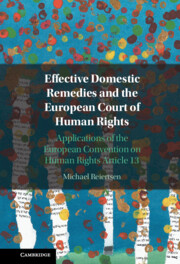 Effective Domestic Remedies and the European Court of Human Rights
Effective Domestic Remedies and the European Court of Human Rights Published online by Cambridge University Press: 11 August 2022
Chapter 10 accounts for requirements of access to justice arising from Article 13, most notably the powers and competences the national autority needs to have, the procedural safeguards that must be provided, the prospect of success which the remedy needs to offer and the speed in which the remedial task must be performed. Most importantly, the chapter accounts for the required scope of domestic review, which, possibly, is the most important practical requirement stemming from Article 13. In early case law, the requirement was negatively delimeted in two aspects. First, the Convention must not be incorporated into domestic law. Second, Article 13 grants no right to challenge primary legislation, as such. This latter delimitation is criticized, and it is argued that the Court should positively require that the domstice remedial authority has the power to correct mistakes stemming from, also, primary legislation. The chapter, then, analyzes the domestic review that the national authority must perform and explains how the Court now requires the legal starting points to be more similar to those applied by the Court and how the concrete scrutiny must be more rigorous.
To save this book to your Kindle, first ensure no-reply@cambridge.org is added to your Approved Personal Document E-mail List under your Personal Document Settings on the Manage Your Content and Devices page of your Amazon account. Then enter the ‘name’ part of your Kindle email address below. Find out more about saving to your Kindle.
Note you can select to save to either the @free.kindle.com or @kindle.com variations. ‘@free.kindle.com’ emails are free but can only be saved to your device when it is connected to wi-fi. ‘@kindle.com’ emails can be delivered even when you are not connected to wi-fi, but note that service fees apply.
Find out more about the Kindle Personal Document Service.
To save content items to your account, please confirm that you agree to abide by our usage policies. If this is the first time you use this feature, you will be asked to authorise Cambridge Core to connect with your account. Find out more about saving content to Dropbox.
To save content items to your account, please confirm that you agree to abide by our usage policies. If this is the first time you use this feature, you will be asked to authorise Cambridge Core to connect with your account. Find out more about saving content to Google Drive.